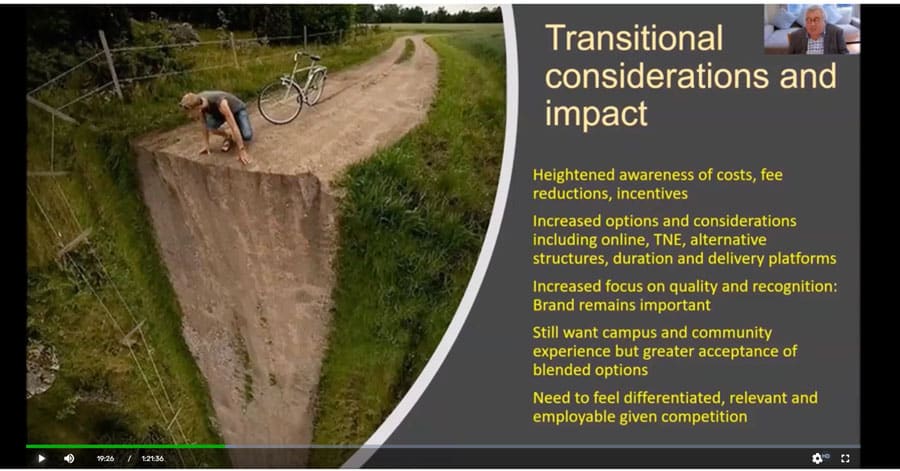Linking labour markets, skills, and study programmes in a disrupted global economy
- Multi-stakeholder research highlights the new competencies global employers are looking at from international student graduates
- The research also sheds light on the more complex set of inputs students are considering when they make study abroad decisions
- Educators are advised to adopt a future-oriented mindset and keep agents abreast of new developments
Career outcomes are without doubt a top priority for the majority of higher education students today, and the perceived return on investment of an overseas programme is central to the decision-making of prospective international students. A presentation by Rob Lawrence, Director of Prospect Research & Marketing Pty Ltd in Australia, at the AIEC Conference in Australia last month provided excellent insights about this important trend in higher education.
Mr Lawrence presented detailed findings from 16 studies conducted over 12 months exploring the priorities of international students and employers in several markets including Hong Kong, Indonesia, Malaysia, Singapore, Sri Lanka, Vietnam, and the UK. The research was well timed for educators working to design courses and marketing strategies that are responsive to today’s changed education landscape and global marketplace.
New industries demand specific competencies
Responses from the hundreds of interviews that went into the research prove that there is an urgent need to create new products and delivery mechanisms attuned to the needs of employers and students and grounded in new and rapidly evolving industries.
Some of the most relevant industries today – all in need of skilled graduates – include:
- Healthcare management and prevention;
- Supply security (e.g., food, components, energy);
- Applied technologies (e.g., animation, immersive, robotics, recognition, AI, apps);
- Renewables, recyclables, water;
- Food technologies (e.g., disease eradication, storage, logistics, packaging);
- Driverless vehicles, fabrication, entertainment, security, hypersonics, micro-medical devices.
Importantly, as Mr Lawrence points out, international students are well aware of these new industries. They are career focused and they are doing research about which fields, programmes, and institutions offer them the best chance of being hired by good employers. If institutions have the capacity to create programmes in these areas or refine existing programmes to make them even more relevant, now is the time to do so – and to create compelling marketing around them.
On a related note, obtaining labour market research on which industries have the greatest skills gaps is something all institutions, as well as governments, should be doing. Doing so paves the way for informed course creation and development and also can serve as an excellent foundation for marketing. Students are actively looking for proof that the skills provided by a programme will have a direct link to an industry that is looking to hire talented graduates.
Flexibility and agility required
Increasing demand for talent in ever-more specific niche industries is one trend. A broader trend is the kind of graduates all employers are looking for, especially as a result of the economic disruption caused by COVID. Mr Lawrence summarises some of these as:
- Flexibility and adaptability, including the ability to work remotely or in-person;
- An ability to hit the ground running;
- An ability to rapidly transition to multiple workplace environments;
- A capacity for bigger picture thinking as well as multi-tasking.
What students are looking for
The pandemic hasn’t disrupted everything: students are still looking at rankings, reputation, quality of education, career outcomes, and destination attractiveness. However, Mr Lawrence points out that international students are now balancing those traditional decision-making inputs with other considerations, as summarised in the screen shot below. These new elements are definitely ones that educators and agents should be aware of in their communications with students.

What educators can do
Mr Lawrence’s presentation was entitled “New perspectives: how market dynamics have shifted needs and expectations.” On theme, Mr Lawrence provided this advice:
- Forget cyclical and embrace the need to adapt and renew;
- Create new products and delivery mechanisms to respond to tomorrow’s needs, not yesterday’s demand;
- Rebuild integration: work towards a more seamless industry than ever [e.g., with pathways leading from one international sector to another in the same country];
- Create relevant product in user-friendly formats, platforms, and options;
- Have a 24/7 virtual and personalised global presence through extended channels and engagement;
- Support the efforts of agents.
That last point deserves special emphasis, as there is a risk entailed in the speed with which educators are having to evolve because of the pandemic: that of agents not being informed in tandem with changes. There has never been a more important time to keep agents aware of new strategic priorities, admissions policies, pricing, COVID safety protocols, industry linkages, potential internships, career services, marketing messaging, and potential pathways (e.g., from online starts in a home country transitioning to in-person in the destination country or from one sub-sector to another). Keeping agents engaged and informed is simply a vital part of international education marketing today.
For additional background, please see:
- “ICEF podcast: Exploring roles and responsibilities in the educator-agency relationship”
- “Most international students say career supports a big factor in their choice of institution”
- “The growing footprint of virtual internships”
- “Australian conference highlights new thinking about international education”
















